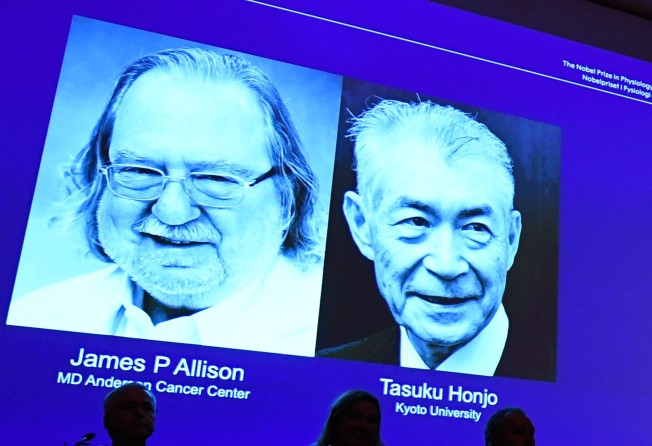James Allison and Tasuku Honjo win the 2018 Nobel Medicine Prize for cancer research
The two winners’ discoveries constitute a landmark in the fight against cancer, according to a statement from the Nobel Assembly

Two immunologists, James Allison of the United States and Tasuku Honjo of Japan, won the 2018 Nobel Medicine Prize for research into how the body’s natural defences can fight cancer, the jury said on Monday.
Unlike more traditional forms of cancer treatment that directly target cancer cells, Allison and Honjo figured out how to help the patient’s own immune system tackle the cancer more quickly.
The award-winning discovery led to treatments targeting proteins made by some immune system cells that act as a “brake” on the body’s natural defences killing cancer cells.
The Nobel Assembly said after announcing the prize in Stockholm that the therapy “has now revolutionised cancer treatment and has fundamentally changed the way we view how cancer can be managed”.
In 1995, Allison was one of two scientists to identify the CTLA-4 molecule as an inhibitory receptor on T-cells.
T-cells are a type of white blood cell that play a central role in the body’s natural immunity to disease.
Allison, 70, “realised the potential of releasing the brake and thereby unleashing our immune cells to attack tumours”, the Nobel jury said.
Around the same time, Honjo discovered a protein on immune cells, the ligand PD-1, and eventually realised that it also worked a brake, but acted in a different way.
On the website of his University of Texas MD Anderson Cancer Centre, Allison said he was “honoured and humbled to receive this prestigious recognition”.
“I never dreamed my research would take the direction it has,” he said.
“It’s a great, emotional privilege to meet cancer patients who’ve been successfully treated with immune checkpoint blockade. They are living proof of the power of basic science, of following our urge to learn and to understand how things work.”
Honjo, 76, meanwhile vowed to push ahead with his work.
“I want to continue my research … so that this immune therapy will save more cancer patients than ever,” he told reporters at the University of Kyoto where he is based.

The Nobel jury said that “for more than 100 years, scientists attempted to engage the immune system in the fight against cancer”.
“Until the seminal discoveries by the two laureates, progress into clinical development was modest.”
Antibodies against PD-1 have been approved by the US Food and Drug Administration as an investigational new drug and developed for the treatment of cancer.
Research by Allison’s team has meanwhile led to the development of a monoclonal antibody drug, which was approved by the US Food and Drug Administration in 2011 for the treatment of melanoma. It is known commercially as Yervoy.
His research also led to the first-ever immune checkpoint inhibitor drug.
Allison and Honjo have previously shared the 2014 Tang Prize, touted as Asia’s version of the Nobels, for their research.
Other cancer treatments have previously been awarded Nobel Prizes, including methods for hormone treatment for prostate cancer in 1966, chemotherapy in 1988 and bone marrow transplant for leukaemia in 1990.
“However, advanced cancer remains immensely difficult to treat, and novel therapeutic strategies are desperately needed,” the Nobel Assembly said.

The duo will share the Nobel Prize sum of nine million Swedish kronor (US$1.01 million). They will receive their prize from Sweden’s King Carl XVI Gustaf at a formal ceremony in Stockholm on December 10, the anniversary of the 1896 death of Alfred Nobel who created the prizes in his last will and testament.
The winners of this year’s physics prize will be announced on Tuesday, followed by the chemistry prize on Wednesday. The peace prize will be announced on Friday, and the economics prize will wrap up the Nobel season next Monday. The literature prize will not be handed out this year after the awarding body was hit by a sexual misconduct scandal.